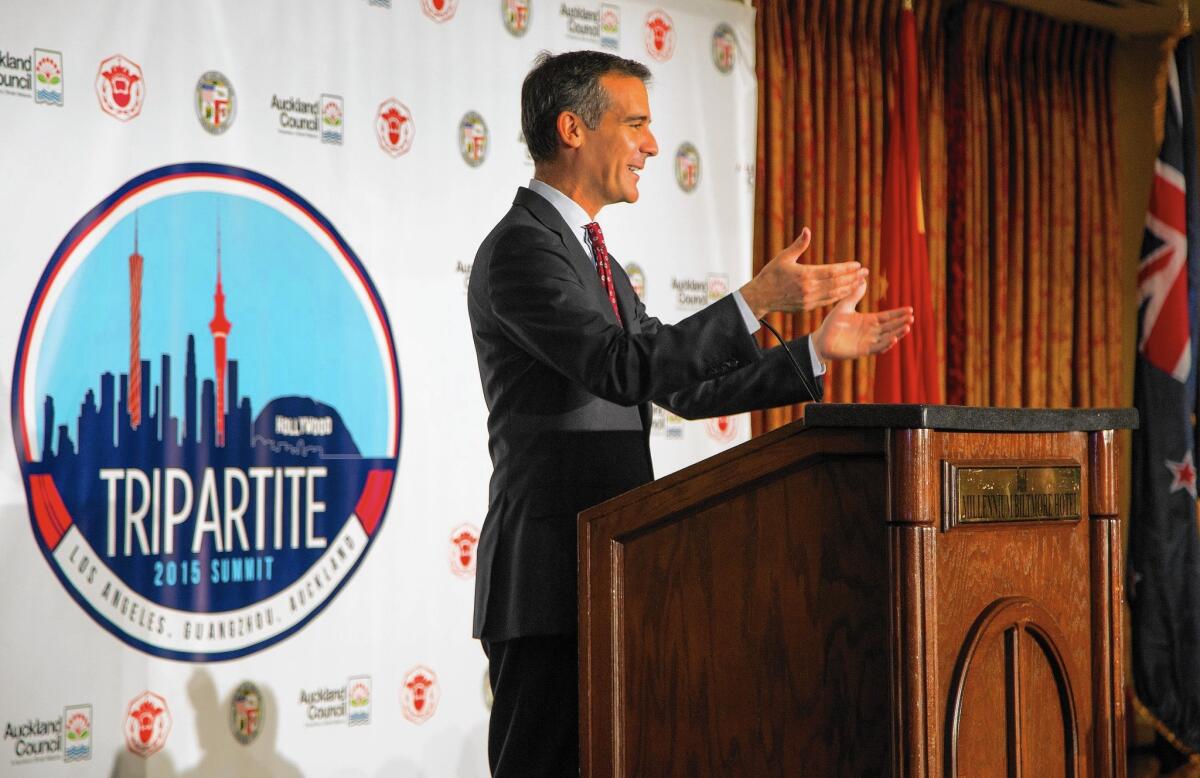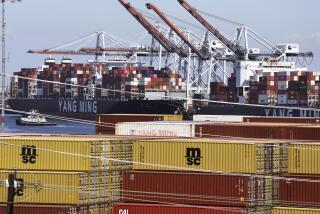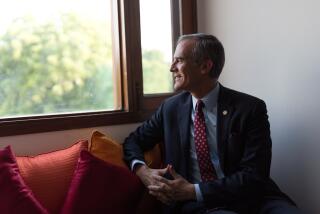Trade pact’s allies, foes unsure which side Mayor Eric Garcetti is on

Los Angeles Mayor Eric Garcetti welcomes officials attending the Tripartite 2015 Summit in June.
Some of President Obama’s steadiest allies in the fight over a sweeping Pacific Rim trade pact have been America’s mayors, who say the freer flow of goods through their cities’ docks and airports would fuel needed job growth.
All but absent from the debate, however, has been the leader of the U.S. city many argue stands to benefit most from the White House’s proposed Trans Pacific Partnership: Los Angeles Mayor Eric Garcetti.
For better or worse, the trade agreement could have a pronounced effect on L.A. The city is home both to the nation’s busiest port complex and to the film industry, whose leaders strongly favor the accord’s expansion of copyright protections in overseas markets. It is also home to some of the staunchly pro-labor congressional Democrats who temporarily succeeded in blocking the president’s efforts to gain greater power to negotiate the deal.
Garcetti has joined neither camp — and has grown conspicuous through his silence. Last month, the U.S. Conference of Mayors sent letters to House and Senate leaders urging them to grant Obama fast-track authority to move ahead in trade talks without interference from Congress. Garcetti did not join the 94 other mayors who signed at least one of the documents, although he had served as chairman of a trade task force for the organization.
Not all mayors take a rosy view of the deal. Voicing the perspective of many left-leaning Democrats, Bill de Blasio of New York City declared that it would be a “huge mistake” to support the Trans Pacific Partnership. (After failing to secure House support in an initial vote, the White House won enhanced negotiating power with backing from congressional Republicans, clearing the way to finalize the tentative agreement with 11 other countries.)
What makes Garcetti’s stand unusual — and, in the eyes of some who have watched his political career, characteristic — is the manner in which the mayor of America’s second-largest city has managed to leave both friends and foes of the Pacific trade deal confused about which side he’s on.
During his 14 years in city government, Garcetti has at times been criticized for indecisiveness and for giving mixed or misleading signals about his stance on divisive topics. Some of his City Council constituents complained that he assured them of his support in local land-use disputes, only to later withdraw it.
This month the mayor angered critics when he announced that he would neither sign nor veto hotly contested legislation cracking down on homeless encampments — instead allowing the bills to become law without his formal approval and directing the police not to enforce them. A previous official statement that he would sign the ordinances was mistakenly issued by a spokesman who had not consulted him about his opinions, the mayor said.
Former City Councilman Bernard C. Parks, who worked with Garcetti in City Hall for 12 years, said he has repeatedly seen the mayor avoid picking sides in potentially bruising political clashes.
“He’s a person that will smooth the waters,” Parks said. “If things can resolve without him having to take the brunt of it, he’s going to take that path.”
The debate over increased trade in the Pacific poses a challenge for two of Garcetti’s most politically important relationships: with the president and with union activists, who have ferociously opposed the deal for fear it could drive U.S. jobs overseas.
In a recent interview, Garcetti said he would not express support for the trade deal until he learns more of its details, particularly on labor standards. He said he was concerned about the agreement’s potential effects on what remains of L.A.’s much-diminished manufacturing sector.
However, he also said he was in favor of fast-track authority, which allows Obama to present a final agreement to Congress for an up or down vote with no amendments. White House officials had argued such authority was necessary to secure the broader trade deal.
“I’m in general supportive of trade,” Garcetti said. “I think that Los Angeles of all places benefits from that. But I also think that people rightfully have some buyer’s remorse over past trade agreements.”
He added, “I’m not used to abstractly taking a position on things that I don’t know the details on.”
Garcetti’s posture is an unusual twist on that taken by the majority of politicians leery of Obama’s trade pact. Many Democrats have said they support the overarching goal of more Pacific Rim commerce but oppose Trade Promotion Authority, often referred to by the acronym TPA, because they want a greater say on the deal’s final contours.
“I haven’t heard of anyone who supports TPA but not TPP,” said Richard Steinberg, a professor at the UCLA School of Law and member of the Council on Foreign Relations who has tracked the debate. “It’s not impossible that there is someone, but I haven’t heard of it.”
The position is unusual, Steinberg said, in part because large amounts of information about the agreement have already been publicized, either by legislators who have been allowed to review it in draft form or through less-conventional channels. The website WikiLeaks has obtained and published portions of the accord’s early versions.
“Enough of the deal is known now, I think, that you’d know whether you support it or not,” Steinberg said.
Garcetti’s ambivalence has at times bred confusion among his peers. Sacramento Mayor Kevin Johnson, an outspoken advocate of Obama’s trade agenda and a former head of the national mayors’ conference, said Garcetti had “been a champion on passing TPA, in Los Angeles and other places, as far as I understand.”
In June, when the president was still struggling to persuade members of his own party to back Trade Promotion Authority, Politico reported that Garcetti was part of a group of U.S. mayors “leading Obama’s charge on trade.” The story quoted Atlanta Mayor Kasim Reed stating that he and Garcetti planned to join forces to lobby members of Congress on behalf of the president.
In a subsequent interview with The Times, Reed reiterated his understanding that Garcetti was a proponent of the trade agreement and said he had heard L.A.’s mayor express his support in meetings with White House officials. “If his position has changed then I’m not aware of it. But as far as I know he was supportive of it,” Reed said.
Garcetti gave a different account. He said he had “never been part of a White House meeting” similar to the ones Reed described. Though he supported fast-track authority for the president, he said, he had made no effort to persuade any federal legislators to share his view.
“I am abstractly supportive” of Trade Promotion Authority, Garcetti said. “I haven’t lobbied members of Congress on it.”
Asked why he had not joined the mayors who signed letters of support to Congress, he said he was unsure if he had been asked. A mayoral aide later said that Garcetti’s office had received a request to sign on but had been given “less than a day” to decide.
The White House did not respond to requests for comment.
Garcetti said he had not felt pressure from labor leaders to oppose either fast-track authority or the larger trade deal. Rusty Hicks, head of the influential Los Angeles County Federation of Labor, said he and the mayor had not discussed the matter.
Gary Toebben, president of the Los Angeles Area Chamber of Commerce, said that he hoped Garcetti could be convinced to offer more full-throated support for Obama’s trade pact, in light of its potential economic benefits to the region. The final version of the agreement will still be subject to a congressional vote — and presumably to a last burst of lobbying from advocates and critics.
“I would say that the city of Los Angeles has more to gain from the Trans Pacific Partnership than any other city in the United States,” Toebben said. “So I hope the mayor can get to ‘yes’ by working with the Obama administration and talking about his concerns.”
Follow @PeteJamison for more news from L.A. City Hall.
More to Read
Start your day right
Sign up for Essential California for news, features and recommendations from the L.A. Times and beyond in your inbox six days a week.
You may occasionally receive promotional content from the Los Angeles Times.







